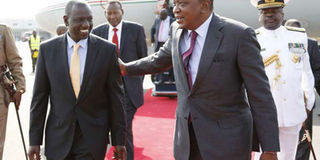How Kenya's Executive legitimises extrajudicial killings by the police

Deputy President William Ruto (left) and President Uhuru Kenyatta at the Jomo Kenyatta International Airport in Nairobi on June 29, 2016. PHOTO | DPPS
What you need to know:
- We must not allow our anger to subside this time.
- We need to increase the pressure on transforming the police force urgently as we head into very tense elections.
- At these moments of high tension, it is imperative the police are non-partisan, smart and de-politicised as anything else will only contribute to the chaos that could easily engulf us.
The silence from President Uhuru Kenyatta and his deputy, Mr William Ruto, on the extrajudicial killings of lawyer Willie Kimani, boda boda driver Josephat Mwenda and taxi driver Joseph Muiruri speaks volumes.
Their deafening silence exposes the lie in their stated commitment to the Constitution, reforming the police, peace, and rule of law.
For today the biggest threat to peace in Kenya is our security forces run amok. Sadly, this is not new, nor is it an isolated incident by a few rotten apples.
Contrast their silence with the actions and statements of President Barack Obama whenever US media highlight a police killing of an innocent man.
They strongly assert that the power and authority given to the police must be used within the law, and reflect an understanding that in a democracy every effort must be made to ensure that those we arm and pay to protect us do not turn into militias for themselves or others.
When those in power condone, tolerate or encourage the violation of the law by state security, you know that we are damningly close to the bottom.
Let’s be clear. These recent killings are not an isolated incident by some “rogue” officers, as those living in high density areas, the Coast and North Eastern can confirm. It is part of the culture within state security organs, and one which is being fuelled by the careless, thoughtless and absurd statements from Interior Cabinet Secretary Joseph ole Nkaiserry.
For when he announces that there is “enough tear gas” to ward off peaceful protests, which he declares illegal despite the Constitution, the message to the rank and file is that it is okay to use as much force as they wish whenever.
And when he says that vetting is making the police lose morale, the rank and file hears that it is okay to be corrupt, extort, kill and do whatever they want for they are protected.
Though it is the responsibility of the State, the Independent Medico-Legal Unit keeps the best statistics of killings in Kenya, and in one of their recent reports tells us that it is easier to be killed by the police than by criminals.
Year after year, bodies are found all over the country killed by the state security. Of course, one hopes that some of these killings are legitimate and are done to preserve the lives of others and of police officers, but in the absence of clear statistics and procedure from the police after killing it is very difficult to discern which killings are legitimate or not. In 1995, the Kenya Human Rights Commission, where I worked, started a campaign—which included documenting police killings. And in incident after incident, it was clear that the police were acting as judge, jury and executioner.
Some of those shot then were reported to be criminals, and in some of these cases, credible evidence emerged that the criminals were acting with the protection of senior police officers and had been killed either because of a deal gone bad, or to wipe out evidence of the connections as dead men tell no tales.
It has not changed since, though the waves rise and ebb. In 2001, the killings subsided after university student Allan Mbito was shot in the back and killed by the police, who tried to make him out as a criminal before finding, to their horror, that he was the son of Judge Gideon Mbito.
Then, as now, our collective horror that someone with middle class lineage could be killed so easily brought a brief lull but the killing waves returned once our attention had been diverted, focusing again on the poor and marginalised who are easily branded criminals, cattle rustlers, terrorists or MRC sympathisers.
We must not allow our anger to subside this time and it was wonderful to see suited lawyers, some in high heels, protesting this past week.
In fact, we need to increase the pressure on transforming the police force urgently as we head into very tense elections. At these moments of high tension, it is imperative the police are non-partisan, smart and de-politicised as anything else will only contribute to the chaos that could easily engulf us.





